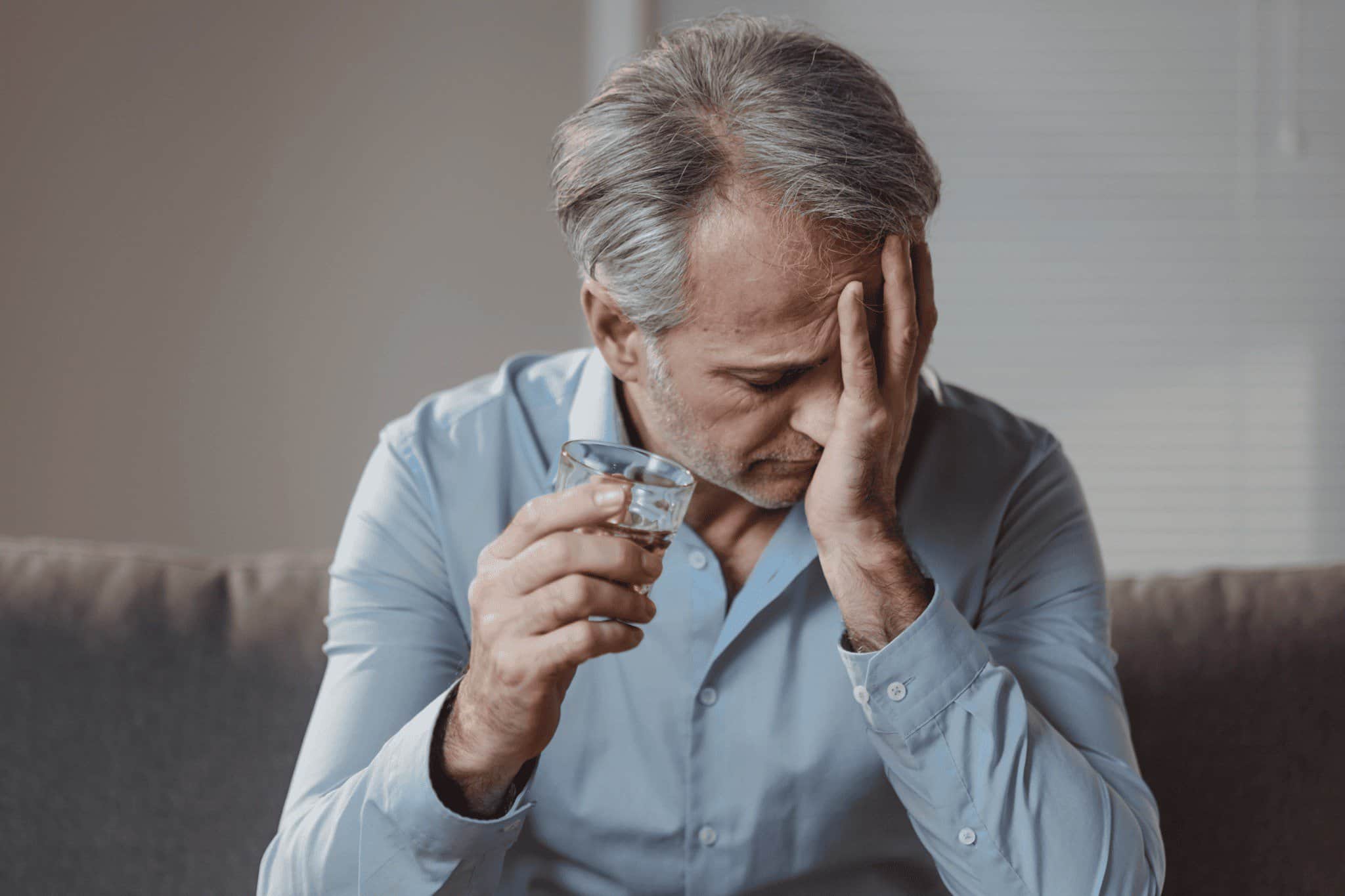How Long Do Alcohol Cravings Last
Cravings during alcohol addiction recovery stem from neurological changes in the brain’s reward system. When individuals quit drinking, their brains still associate pleasure and relief with alcohol, leading to persistent cravings. Environmental triggers, emotional factors, and physical symptoms further contribute to cravings.
Check Insurance Coverage
"*" indicates required fields
How Long Does Alcohol Withdrawal and Alcohol Craving Last?
The duration of alcohol withdrawal and cravings can vary significantly from person to person and depends on several factors. Alcohol withdrawal symptoms typically begin within hours after the last drink and can last for several days.
Acute Alcohol Withdrawal Symptoms
Acute alcohol withdrawal symptoms encompass a range of physical and psychological reactions that individuals grappling with alcohol use disorder may encounter when they abruptly cease or significantly reduce their alcohol intake. These typically emerge within hours to a few days after the last drink and can vary in intensity.
Common manifestations include heightened anxiety, tremors, nausea, profuse sweating, sleep disturbances, headaches, and rapid heartbeat. In severe cases, individuals may experience hallucinations, seizures, or even a life-threatening condition known as delirium tremens (DTs), characterized by severe confusion, agitation, hallucinations, high fever, and seizures. Notably, the risk of severe withdrawal symptoms is higher in individuals with a history of heavy and prolonged use.
However, even after completing the acute withdrawal phase, many individuals experience post-acute withdrawal symptoms (PAWS). These symptoms, including cravings, can persist for a more extended period, ranging from weeks to months and, in some cases, up to two years. PAWS can make early recovery challenging, as individuals may continue to experience cravings for alcohol.

How to Manage Alcohol Cravings
Managing alcohol cravings is a crucial aspect of maintaining sobriety during the recovery journey. Here are some effective strategies to help individuals cope with and overcome alcohol cravings:
Recognize Triggers: Identify the specific situations, emotions, or people that trigger your cravings. Awareness of these triggers is the first step in managing them.
Distraction Techniques: When a craving hits, distract yourself with a different activity. Engage in a hobby, go for a walk, or immerse yourself in a book or movie to redirect your focus.
Positive Visualization: Visualize a future without alcohol, focusing on the benefits of sobriety, such as improved health, relationships, and well-being.
Mindfulness and Meditation: Mindfulness techniques can help you stay in the present moment and reduce impulsive cravings. Meditation and mindfulness practices can be powerful tools.
Why Does Alcohol Abuse Occur?
Alcohol abuse can be attributed to a complex interplay of factors, both physiological and psychological. For many individuals, alcohol consumption begins as a social or recreational activity, but over time, it can evolve into problematic drinking patterns. Alcohol use disorder, characterized by a persistent and compulsive need to consume alcohol despite adverse consequences, is a significant driver of alcohol abuse.
Physiologically, alcohol consumption can lead to changes in the brain, particularly in the reward and pleasure centers. The brain adapts to the presence of alcohol, which can result in alcohol cravings and withdrawal symptoms when an individual attempts to quit or cut back. The experience of these cravings can be intense, and managing them is a critical aspect of addiction recovery.
Psychologically, many people turn to alcohol as a coping mechanism for stress, anxiety, or underlying emotional issues. Mood-altering effects can provide temporary relief, reinforcing the cycle of abuse. Mood swings, low energy, and emotional instability often accompany alcohol abuse, making it difficult for individuals to stop drinking.
Moreover, environmental factors, such as exposure to alcoholic beverages, social influences, and ready access to alcohol, can contribute to ongoing substance abuse. The vicious cycle of cravings for an alcoholic beverage, withdrawal, and cravings again can make it challenging for individuals to break free from alcohol dependency.

Alcohol Addiction Recovery
The process of alcohol addiction recovery is a challenging yet transformative journey that involves multiple phases and strategies. It begins with the acknowledgment of substance use disorders and the decision to seek help. The first crucial step often entails alcohol detox, during which individuals may experience severe withdrawal symptoms, including physical pain and intense alcohol cravings. This phase is typically supervised by medical professionals to ensure safety and comfort.
After completing detox, individuals may continue to experience cravings as part of post-acute alcohol withdrawal. These cravings can persist for an extended period, making it essential to develop effective strategies to curb cravings. Managing cravings is crucial for recovering alcoholics to avoid relapse.
Recovery involves learning coping tools to navigate triggers, stressors, and emotional challenges without resorting to drink alcohol. These tools help individuals address the root causes of addiction, which can include psychological, emotional, and environmental factors.
While there’s no fixed rule for how long cravings last, it’s important to understand that experiencing cravings is extremely common during the recovery process. Staying sober and maintaining recovery often means making a conscious choice not to drink alcohol or engage in drug use despite these cravings.
Throughout recovery, individuals may benefit from therapy, support groups, and a strong support network to provide emotional backing. The journey to stay sober is an ongoing one, and success lies in understanding that cravings are a part of it but need not dictate one’s path. Ultimately, recovery involves embracing a healthier, more fulfilling life free from the grip of addiction.
The Post-Treatment Recovery Journey

Post-treatment recovery for individuals overcoming alcohol addiction is a critical phase that requires resilience and ongoing commitment. After completing alcohol detox, which often involves managing severe symptoms and withdrawal-like symptoms, individuals may still experience cravings. These alcohol cravings can be persistent and challenging, but they are a common aspect of recovery.
In the post-treatment phase, the focus shifts to developing strategies to curb cravings and prevent relapse. Recovering alcoholics learn valuable coping tools to address the root causes of their addiction, which may include emotional triggers and environmental influences. While there may not be a fixed rule for how long cravings last, individuals are empowered to make the choice not to drink alcohol or return to drug abuse, even when faced with these temptations.
One of the essential aspects of recovery is the pursuit of a healthier, sober lifestyle. This involves maintaining sobriety by actively choosing to stay sober and finding fulfillment in life without the need for substances.
Relapse Prevention Techniques
The journey to recovery is marked by the recognition that while cravings may occur, they need not define one’s path. With determination, the development of coping skills, and ongoing support, individuals can continue to make progress toward a fulfilling and sober life.
- Identify Triggers: Recognize the people, places, emotions, and situations that trigger cravings or thoughts of substance use. Understanding your triggers is the first step in avoiding them.
- Develop Coping Skills: Learn healthy ways to cope with stress, anxiety, and other emotions that may lead to substance use. This might include practicing mindfulness, meditation, or deep breathing exercises.
Emotional Backing from Support Groups
Joining support groups like Alcoholics Anonymous (AA) or Narcotics Anonymous (NA) plays a crucial role in the recovery process for individuals struggling with substance abuse. The importance of these groups can’t be overstated for several compelling reasons:
Accountability: Attending regular meetings provides a structured way to stay accountable for one’s sobriety. Knowing that you’ll be reporting your progress to a group of supportive individuals can serve as a powerful motivator to stay on track.
Shared Strategies: In support groups, members share relapse prevention techniques, coping strategies, and tips for overcoming cravings. Learning from others who have successfully navigated the challenges of recovery can provide valuable insights.
Emotional Support: Recovery can be emotionally taxing, and support groups offer emotional backing during difficult times. Members can provide encouragement, empathy, and a listening ear when needed most.
Positive Peer Influence: Surrounding oneself with individuals committed to sobriety can have a positive influence on behavior. Being part of a group that values abstinence can reinforce the commitment to staying substance-free.
Higher Success Rates: Numerous studies have shown that participation in support groups like AA or NA is associated with higher rates of abstinence and long-term recovery. The structured and supportive nature of these groups contributes to their effectiveness.
Spiritual and Psychological Growth: Many support groups, including AA, emphasize spiritual and personal growth as part of the recovery process. This holistic approach can help individuals not only overcome addiction but also enhance their overall well-being.
Community: Support groups create a sense of community and belonging. They provide an opportunity to build new, healthy social connections and reduce isolation, which is common among those in recovery.
Continuous Learning: Recovery is an ongoing journey, and support groups offer a platform for continuous learning about addiction, relapse prevention, and personal growth. Meetings often feature discussions, guest speakers, and literature that promote education and self-improvement.
Long-Term Sobriety: Many individuals who have successfully maintained long-term sobriety attribute much of their success to participation in support groups. These groups provide a consistent source of encouragement and motivation throughout recovery.

Get Professional Help to Quit Drinking
At Elevate Recovery Centers in Massachusetts, we understand the detox process and can provide a safe space to overcome the difficult cravings when you quit drinking. We provide evidence-based treatment that focuses on the physical, emotional and spiritual aspects of recovery. Our compassionate team of professionals is dedicated to helping you reclaim your life. Contact us to break free from the urge to abuse alcohol.
Drug Detox in Massachusetts
Elevate Recovery Center in Massachusetts offers a comprehensive drug rehab program including detox, medication-assisted treatment (MAT), and evidence-based therapies. We can help people struggling with addictions to benzodiazepines, stimulants, opioids, and more begin their journey to sobriety. To learn more about our Massachusetts detox programs or to find help for yourself or a loved one, pick up the phone and call now.
Begin The Journey To Lasting Recovery
We believe everyone struggling with substance use disorder deserves the treatment they need. Our team is here to help you every step of the way.
"*" indicates required fields
